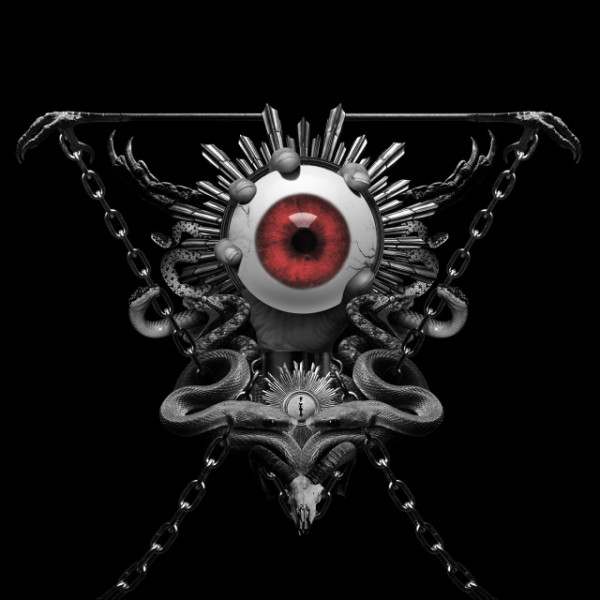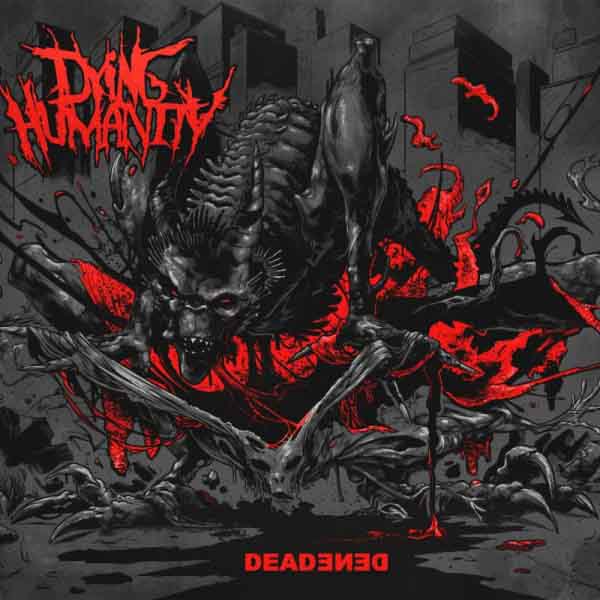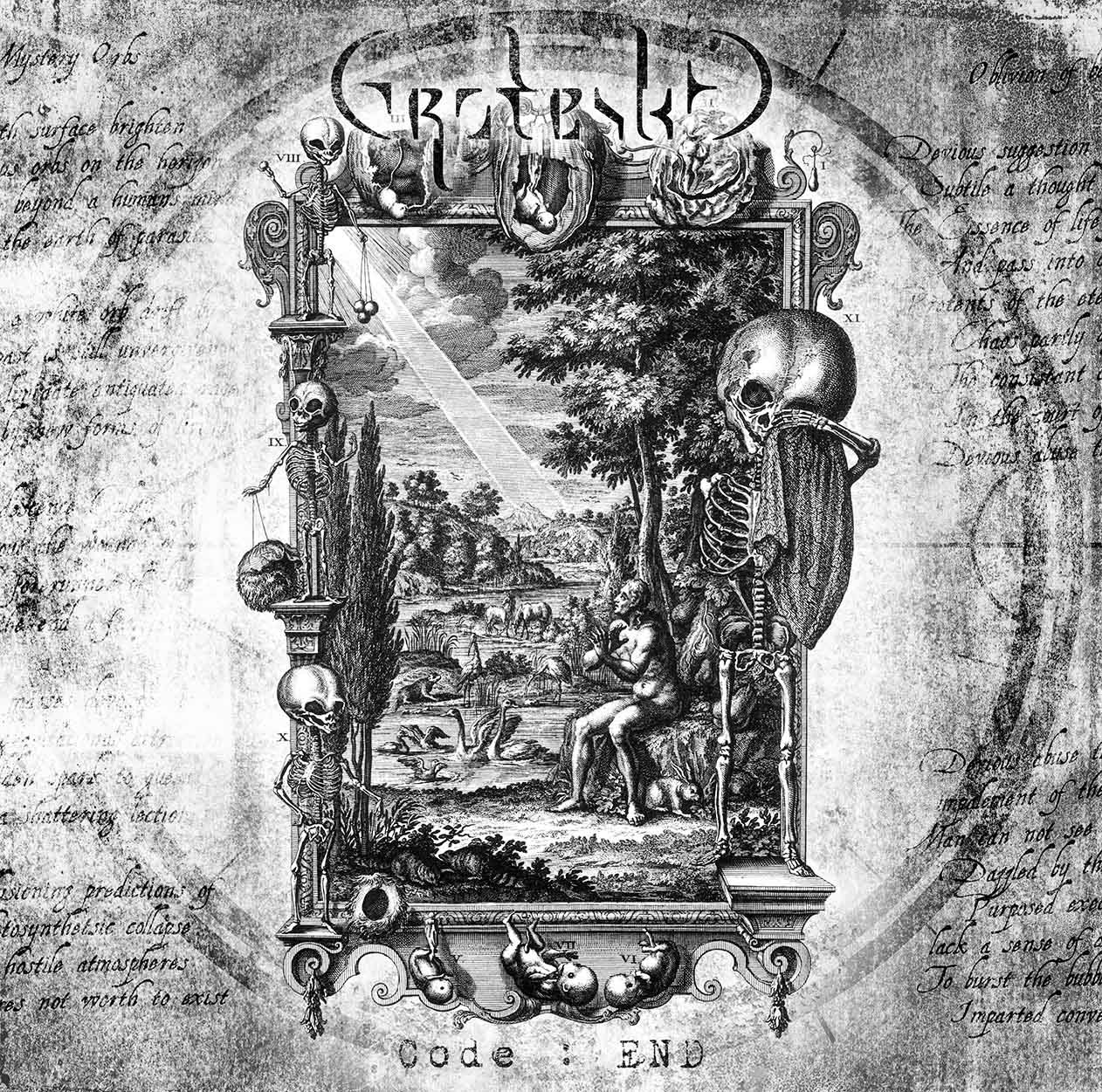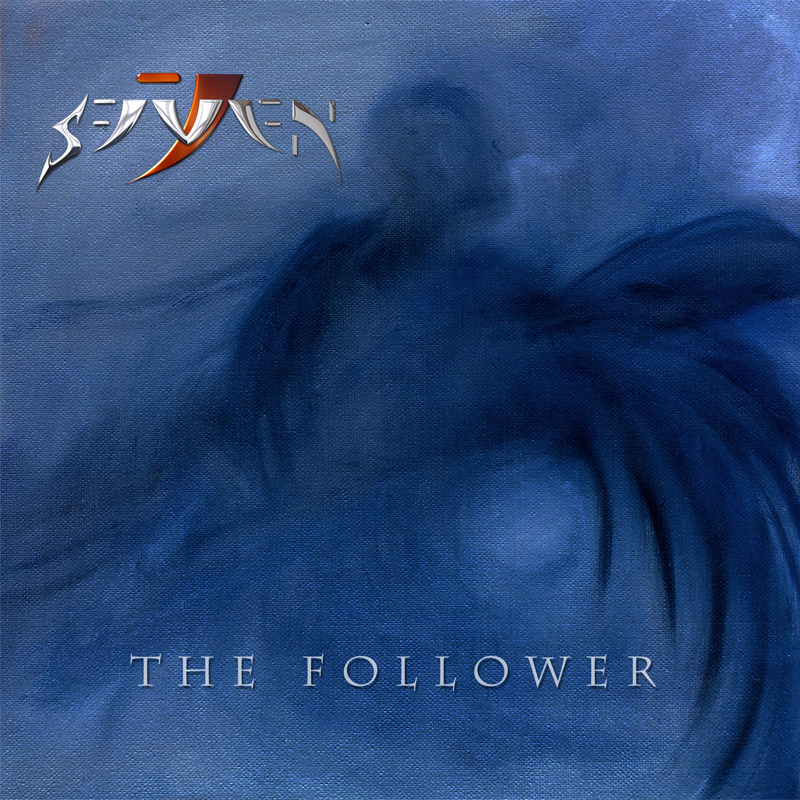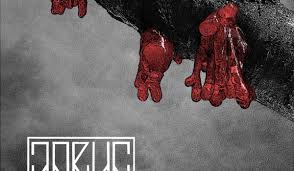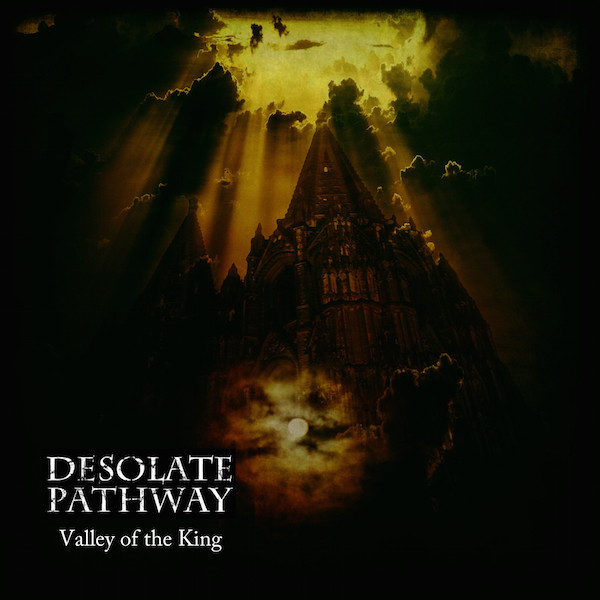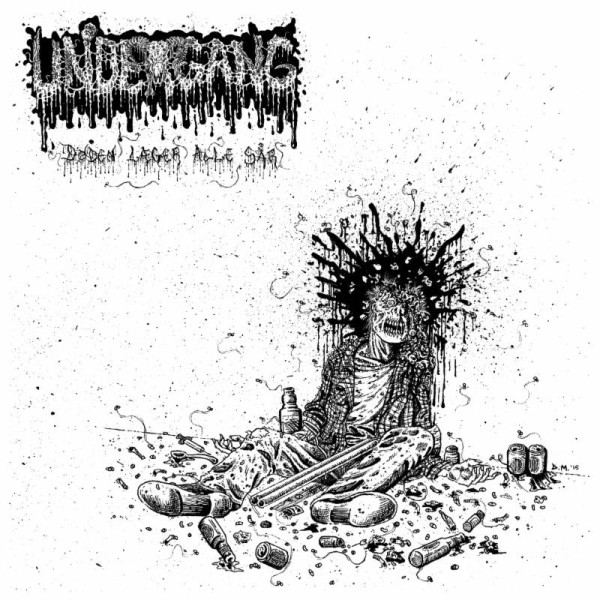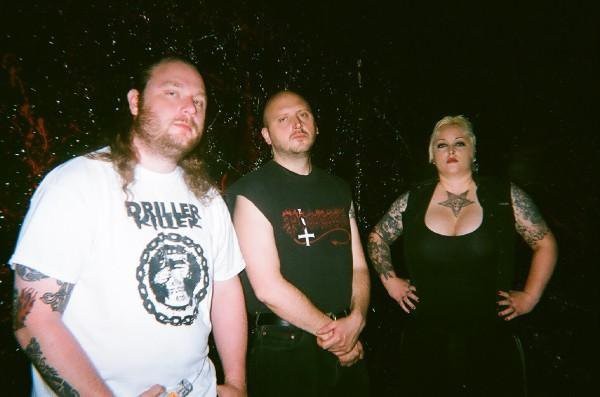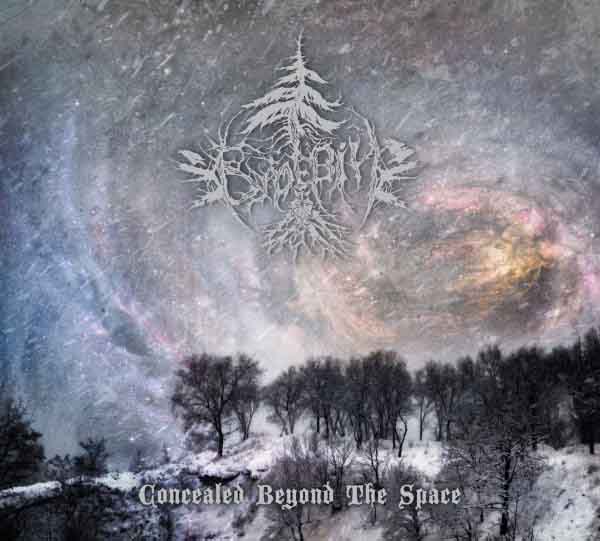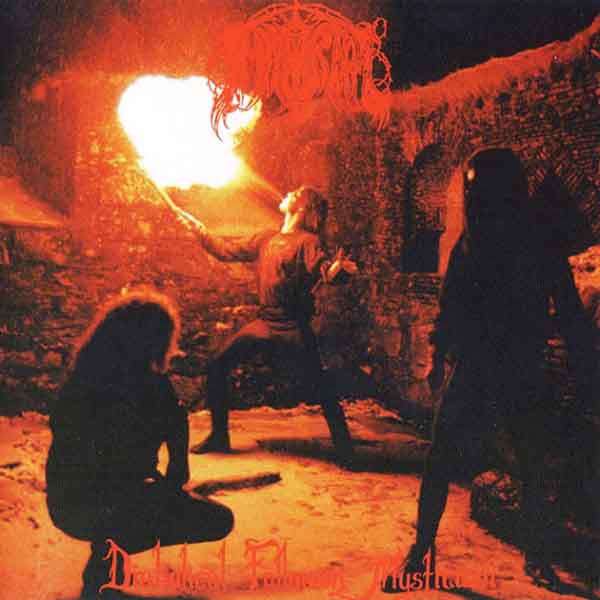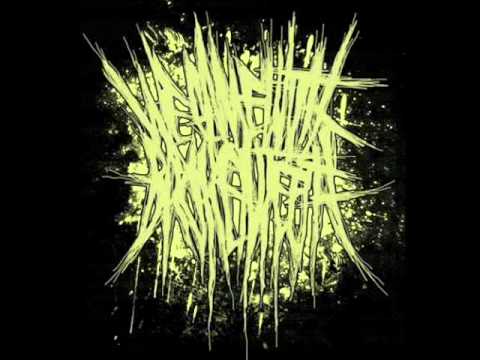
Introduction
Extreme metal, specifically grindcore music from the beginning of the 21st century to the present day, has been composed and distributed between digital-communities. Grindcore has often existed exclusively within online communities and abandons its previous ‘live’ traditions. This online phenomenon is sometimes described as ‘cybergrind’, defined only partly by its musicality (i.e. rhythm, structure, notation), but more importantly by the cyberspace in which extreme metal music is staged through the Internet. This will detail a brief history of grindcore’s online migration and transient occupation of various cyberspaces on the Internet. I will discuss a few of the reasons for grindcore’s online relocation and evaluate the more discursive nature of the music that warrants it’s suggestively ‘non-musical’ prefix (cyber) in an attempt to provide a more encompassing study surrounding the music.
Space – Cyber
The beginning of the 21st Century saw an online musical phenomenon that made a serious impression on the music business. Grindcore’s online relocation was indeed partly an impression if not a reaction against commercial music businesses and provided a community for self-published and non-profit grindcore to exist. Rosemary Overell’s book,
In an interview with Mike Glenn, ‘programmer’ for Myspace based grindcore band, ‘wecamewithbrokenteeth’; “It was definitely an internet phenomena, although I really don’t keep up with the ‘scene’ anymore. I believe WCWBT kinda took the ‘cybergrind’ thing to a new level and spread it to the masses more so than other acts … our online fan base was definitely our strongest”. My interview was undertaken on Facebook, whereby the ‘wecamewithbrokenteeth’ page is located and acts as their ‘official’ cyberspace. Benedict Anderson may have described this online phenomenon as an ‘Imagined Community’, or self-conceived nation (1991). However, the music’s online exclusivity suggests that it was far from imagined, but as close to a real environment as necessary (for both artist and consumer); the transient nature of cyberspace is more freely adaptable than the set-in-stone physicality of the ‘stage’. In Lysloff René’s, Musical Community on the Internet, he states that:
Many websites do represent the loci of complex networks and social relationships that are in fact dispersed in geographical space. What bought us all together were the metaphorical places that stood as monuments to the social relationships created through them. Thus, Internet research entails a form of travel, in a metaphorical sense to radically different kinds of social place … I argue that on-line communities … are as ‘real’ (or imagined) as those off line. – René, L. (2003)
‘Cybergrind’ exists as a non-profit community whereby free distribution amongst fans is encouraged to promote the music to a wider audience. This was also articulated by Glenn, “The few things we did release were free, I’m a heavy music pirate myself, so why the fuck not? I’m cool with YouTube and all that, anyway, to get your name out there is a plus in my eyes.” An online record label, ‘Grindcore Karaoke’ (2011), enable free downloads for all of their featured-artists. Vocalist for ‘Agorophobic Nosebleed’, J Randall, initiated this non-profit organization. This label ‘employs’ grindcore artists globally, such as Birmingham based ‘Kuntpuncher’, and Japan based ‘Self Deconstruction’. Their first release was ‘Grindcore Lu’au’ by ‘Wadge’ and advertised weekly uploads; their last upload was ‘CLVB DRVGS’ ‘Beach Blanket Bong Out’, published on the 10th March, 2014, however the music remains available for download (last accessed 22/04/15). Tom Bradfield, owner of Grindethic records, has expressed how online relocation has inevitably affected the industry, specifically record labels; “I suspect that even if piracy was somehow eradicated (which it won’t be), then the move to downloading would still have happened anyway. The hard thing is convincing people to pay for something they can easily get for free.” Therefore, the power the Internet has provided a convenient platform for artist self-promotion, but potentially threatens industry establishments such as Grindethic records.
René (2003) describes this phenomenon as a ‘new materiality’; “On-line music production and dissemination set up the conditions for a prestige economy in which ‘goods’ … are exchanged by electronic means. As with other on-line communities … the Internet provides a new materiality through which social interaction and group formation can take place and from which new possibilities for subjectivity and group identity can emerge.” Therefore, grindcore labels/artists may still be adapting to this ‘new materiality’ the Internet continues to provide.
‘Extreme Metal in Lebanon’, as researched by Mark LeVine, exists on the Internet for political reasons. In his book, Heavy Metal Islam: Rock, Resistance, and the Struggle for the Soul of Islam (2008), LeVine describes the band, ‘Oath to Vanquish’, as one of the “most distinctive Death Metal/Grind bands in the MENA”. The Lebanese government banned certain Heavy Metal CD’s at the beginning of the 21st Century, however they remained increasingly available on the Internet, a platform less hindered by political censorship. LeVine describes the Internet as a ‘liberating Power’ and musicians as part of a “cyber-intifada”. The band tackle political issues in their music lyrically, “through the veil of allegory and unsettling imagery”. ‘Oath to vanquish’ are signed to UK-based ‘Grindethic’ records, however according to LeVine, “the farther you are from the mainstream in Lebanon, the greater the risk of persecution.” According to LeVine, extreme metal in Egypt is similarly restricted, “many young Egyptians found more useful things on the web, from political blogs to heavy metal forums, that help them resist or at least survive, government oppression.”
The absence of ‘live performance’ due to a rise in online-presence has raised certain authenticity debates, some of which I shall discuss now. In my own interview with Tom Bradfield (Grindethic), he wrote that:
The Myspace era was probably the turning point for underground bands being able to exist outside of the live environment. Before the Internet there was no point in having a band that didn’t play gigs … Now there was a way to expose yourself to potential fans and build a support base without needing to play live. This coincided with home recording becoming more affordable so bands could produce demos of ever increasing quality without studio time necessarily being a prohibitive cost. – Tom Bradfield.
The absence of live performance and the internet-as-stage may be what Chanan describes a loss of authenticity due to various techniques of reproduction:
Technique of reproduction detaches the musical work from the domain of the tradition that gave birth to it, and destroys what Benjamin calls the aura which signals its authenticity; except that it also creates new types of musical object which do not belong to a particular domain but rather anywhere that a loudspeaker (or earphone) may be found – some of these recordings cannot be performed live at all. This process also redefines the audience, which comes to be constituted quite differently from before. It is no longer limited to traditional concepts of community. – Chanan, M. (1997)
However I believe that the ‘aura’ is still present in a cyberspace, but I agree that there is obviously a detachment from traditional conceptions of ‘liveness’ and ‘community’. Grindcore has therefore transcended this barrier of authenticity by its often-unfeasible existence in a ‘live’ and ‘real world’ environment. This further points to grindcore’s inherent anti-establishment disregard for previous ‘formats’ (I will later discuss this in relation to musicality) and is therefore a liberating factor for both musicians and listeners. In the same way that the Beatles’ never performed ‘Sgt. Peppers’, whereby live performance wasn’t felt necessary or wasn’t possible; Glenn states, “We never actually played live shows, although I’ve heard stories of people claiming to be us and playing shows under the name, haha. WCWBT was strictly an online thing.” Similarly, Tom Bradfield told me about one of his own bands:
I joined a band called Repulsive Dissection where the members had come together for the first time over Myspace. We were variously located in Ukraine, Japan, UK and Sweden, so the idea of playing live was never seriously considered … The internet allowed us to send material backwards and forwards online and collaborate on writing. We could all record separately and compile our efforts at the end, and to this day I’ve never met the guitarist in person. – Tom Bradfield.
Weinstein (2000) states that, “Most bands never sign a record contract. They are the losers in a Darwinian struggle for access to the facilities of the mediators: The record companies and the concert promoters”. However, Bradfield argues that it is in fact; the record labels are now equally involved in a ‘Darwinian Struggle’, although they’re power as ‘gatekeepers’ (or trend-setters) within the industry are still apparent in providing a ‘stamp of approval’:
I’m sure mass consumption of music, and all media in general, can only be heading towards streaming everything online, but a new generation of artists will embrace this and find new ways to present their music. How labels will survive this change is harder to foresee. I think there will still be a need for labels to exist as a way of putting a stamp of approval on the top bands and helping to raise them above the rest. – Tom Bradfield.
Australian grindcore band, ‘The Bezerker’, existed online for both performance limitations and to simultaneously self-promote through successful social media such as Myspace and their own website. They also departed from ‘Earache Records’, famed for signing traditional grindcore artists such as, ‘Napalm Death’ and ‘Carcass’. This short text by Brian Fischer is the first time I have seen the term, ‘cyber-grind’ used in any published writing, although does little to describe what ‘cybergrind’ actually is:
The bezerker is an extreme metal entity from Melbourne that plays a noise form of cyber-grind. The band is the brainchild of … Luke Kenny, a one time metal and grind drummer who was forced to give up his instrument after sustaining near-fatal injuries in a motor vehicle accident… Kenny began to produce music that was a cross between “gabba” techno and industrial grind … The Berzerker split from Earache in 2008 and their fifth album came out on September 1, 2008 through the band’s website exclusively. – Fischer-Giffin, B. (2002)
‘The Bezerker’ may have departed from the established ‘Earache Records’ due to the apparent trend towards the self-sufficient sustainability of Internet based promotion and publication.
Musicality – Grindcore
The Oxford dictionary defines ‘Cyber’ as, “Relating to or characteristic of the culture of computers, information technology, and virtual reality”. In which case, one could argue that grindcore music is now in a ‘cyber age’, where computers are an interface not only for music production, but also for mediation, collaboration, and consumption. Certain musical aspects can be attributed to the style as a contributory defining factor:
“I’m proud to say it’s the fastest, and nothing can be faster, sorry Dave, [Dave Lombardo, Slayer] but it’s just not fast enough mate” – Mick Harris, Napalm Death
Derek Roddy (2007) describes ‘blast beats’, a traditional musical signifier of grindcore as a genre defining feature: “Until now, blast beats have been a musical myth … a part of musical expression since the 1980s with the European grindcore movement … a form of musical expression on it’s way to becoming it’s own genre.” The speed and physical performance of grindcore ‘blast beats’ could be seen as, “a fulfilling achievement that one can be proud of”. Drum machines are often programmed to perform ‘blast beats’ at a speed and metronomic precision previously unachievable in ‘human performance’. Drum machines are used as an instrumental signifier of the ‘post-human’ speed and technical precision predominantly unachievable in human performance. (Refer to my transcriptions of ‘Wecamewithbrokenteeth’ and ‘Malodorous’). This renders Mick Harris’ (Napalm Death) statement that ‘nothing can be faster’ as limited to a ‘live’ grindcore tradition. The processual nature of genre shows a dramatic transformation of opinion to what constitutes ‘grindcore performance’, when drum machines replace human; ‘Sorry Mick, it’s just not fast enough mate’!
“We’ve sort of abandoned musical standards, we don’t write songs to the ‘rock’ sort of format. We’re pretty much the end of the line, I don’t think you’re going to get a band that’s more extreme than us.” – Shane Embury, Napalm Death
Napalm Death, along with the other grindcore artists strive to be the most ‘extreme’ in terms of musicality. Overell (2014) describes this as a sense of ’more-than-ness’. If the performance is then eradicated from the ‘brutal’ experience, surely this lack of ‘liveness’ constitutes less extremity. The ubiquitous use of drum-machines in cybergrind is a way of sonically identifying the music as ‘digital’ or ‘cyber’. Thus the music’s existence is inherently impossible in a real-world environment such as a stage; it is also reliant on computer based interfaces i.e. VST instruments, DAW’s, Audio Interfaces which are becoming increasingly more popular. Harris (2006) states that, “Only in slower forms of extreme metal is ‘putting on a [live] show’, in a conventional sense, possible.” Harris does not elaborate on his use of the word ‘conventional’, although could be referring to the use of electronic instruments and physical constraints of an ‘acoustic’ musical performance. ‘Wecamewithbrokenteeth’, gained popularity through Myspace around 2005 and built their fan base through social networking. Their music was produced on FL Studio, and until 2006, only used computer generated instruments, minus vocals, such as FLslayer for synthesized Guitar tracks; the low-end pitches would have been impossible to effectively produce on a detuned electric guitar. The vocal parts are the only ‘live’ recorded part of the music.
There are many ways in which ‘extremity’ is now raised within the Genre. The first is musicality, where musicians are striving to make the fastest, shortest or most sonically dense Grindcore possible. (Refer to my transcriptions of Napalm Death and Clotted Symmetric Sexual Organ). The second and more controversial way in which extremity is pushed is lyrical subject matter, resulting in subgenres such as ‘Porogrind’ and ‘Goregrind’. As mentioned in Nasum’s online biography, a change in aesthetic and lyrical content results in a deviation from ‘true grindcore’. Tom Bradfield states, “The one thing I’m bored of is all the misogynistic rape/gore type lyrics that are still pretty prevalent.” Bradfield is more concerned with ‘punkier origins’ or traditional grindcore aesthetic, “For many though I think the punkier origins of grindcore lend it to a more political direction which I still think works well with the inherent aggression in the music.”
Despite this, the lyrics in Grindcore music are often unidentifiable due to the vocal style. This is however, unimportant; Simon Frith’s (2007) theory on Metal vocal style; “ The tone of voice is more important … than the actual articulation of particular lyrics. We can thus identify with a song whether we understand the words or not, whether we already know the singer or not, because it is the voice – not the lyrics – to which we immediately respond.” Weinstein (2000) adds that, “Special sounds, especially screams, serve to emphasize the power and the emotionality of the voice”. Tom Bradfield states that, “To be honest I’m not particularly interested in the lyrical content of bands, even if it aligns with something I personally believe in. First and foremost I care about the music itself, and the concepts or message behind the band doesn’t sway me too much either way when it comes to signing them.”
There were many complex eco-systems in action during the emergence of Grindcore, of which I will give a brief description now. Common belief is that grindcore was initiated in Birmingham with Napalm Death. The local aspect of Birmingham’s grindcore is often romanticised but its rapid globalization was apparent from its early years. I have provided one a brief case study into the globalisation and subsequent migration of grindcore into cyberspace. Popat (2005) argues that the nature of the Internet is solipsistic, “Communities of interest [Music] are most likely to arise since communities of locality and social structure, for example, mean little in the remoteness of the online environment.” However, I feel that this could be conceived as creating some form of online social ‘locality’. The locality is in this case, a specificity of taste and tied by interest. She continues, “Although a vast number of people with different interests and concerns may be using the Internet, it is likely that they will only tend to communicate with others sharing their interests”.
‘Clotted Symmetric Sexual Organ’ (C.S.S.O) were a Japanese grindcore band active from 1993 – 2001. Their composition, ‘P.S. I Love You’, was released on a compilation or ‘Split’ CD entitled ‘Grindworks’, featuring other grindcore artists Nasum (Sweden), Retaliation (Sweden), Vivisection (Japan) and C.C.S.O (Japan). The CD was released in Sweden on the label, ‘Grindwork Productions’, whom only ever released two albums; the compilation mentioned and Swedish group, Nasum’s ‘Domedagen’ (1994). ‘P.S. I Love You’, resonates with the jazz standard by Gordon Jenkins (1934), and later the Beatles (1962). As articulated by Shane Embury, grindcore abandons previous ‘rock formats’, and therefore the reclaiming of ‘P.S. I Love You’ is a way in which C.C.S.O subverted the ubiquitous ‘love song’ as a reaction against conformity and ‘popular’ musical idioms. The total length of the composition, 10 seconds, also suggests a reactionary musical form established by Napalm Death as a grindcore idiom. This particular case demonstrates the global impact of grindcore in 1994, and how it’s ‘rarity’ elicited an online re-release through the ‘The Grind Show” on YouTube (3 October 2011). The video has 124 views (last accessed 14 February 2015) and published by ‘The Grind Show’, a YouTube channel and cyberspace seemingly dedicated to sharing rare grindcore recordings. The obscurity and lack of popularity for this particular track is by no means a reflection of cybergrind’s popularity in general (I will demonstrate this in later case studies), but more a reflection of a communal effort in preserving grindcore of the past, or ‘non-cyber’ grindcore into a virtual and residual ‘mosh-pit’ or communal appreciation and canonization of ‘extreme’ music that is no longer active as a ‘Live’ tradition (C.C.S.O haven’t performed live since 2001).
This canonization within cyberspace also exhibits bands such as ‘Napalm Death’ despite their ongoing ‘live’ presence and commercial releases. This is quite often an exception whereby ‘Napalm Death’ transcends both ‘live’ and ‘cyber’ communities, most likely due to their wide acceptance as satisfying the definition of ‘grindcore’. This online existence is celebrated as a further disassociation from previous ‘rock formats’. Ironically this music has now fallen into a Cyberspace, and more importantly, it has been canonized within ‘The Grind Show’ musical-program, thus adopting an extra-musical narrative as part of a contemporary grindcore community. Of course, most ‘popular music’ can be found somewhere on the Internet, but it’s online exclusivity (apart from several hard-copies available second hand on Discogs) could infer it’s belonging to a cybergrind community. This dissemination could also be seen metaphorically as a larger scale ‘split’ recording, whereby Artists share a physical platform or space for economic viability, building a larger fanbase, and generally building a larger sense of community.
Following on from talking about musicality, collaborative techniques used in a traditional group environment are varied in online grindcore. Tom Bradfield spoke to me about his experience collaborating over the Internet:
I joined a band called Repulsive Dissection where the members had come together for the first time over Myspace. We were variously located in Ukraine, Japan, UK and Sweden, so the idea of playing live was never seriously considered. We came close once but a visa issue scuppered plans at the last minute. The Internet allowed us to send material backwards and forwards online and collaborate on writing. We could all record separately and compile our efforts at the end, and to this day I’ve never met the guitarist in person. – Tom Bradfield.
A similar musical experience was realized by grindcore artists, ‘Malodorous’, who compose in remote geographical locations for a ‘web-based’ collaboration. Sita Popat argues the Internet as an enabling factor for opportunities in remote interaction and collaboration “on a scale never before imaginable”. She explains that the possibility to communicate and transfer media “simply, quickly and relatively cheaply between people around the globe.” She also believes that the Internet provides a uniquely asynchronous collaborative process can potentially work in favour of creativity. “This process promotes ‘reflective’ communications and the considered response. It does not rush the communication into a reaction, and as such it allows time for crossing that proscenium thoughtfully.”
Overell’s writing, although partly focused on affective space, does not mention the Internet as a space in itself, although focuses exclusively on grindcore as a ‘live’ tradition. She discusses the benefits of long distance communication for organisation of international events, “Via email, Sensei nominated suitable dates and Joel organized gigs at Melbourne venues.” Rene describes the ‘culture of simulation’ to what Arturo Escobar calls ‘cyberculture’. Rene goes on to describe that, “although the Internet may be rooted in familiar terrain, it still holds the promise of new cultural narratives and social formations.” The Internet has proven to be as much of a social phenomenon, if not more than grindcore music itself. Popat quotes Dix et al, “[The Internet] is much more a social phenomenon than anything else, with users attracted to the idea that computers are now boxes that connect them with interesting people and exciting places to go, rather than soulless cases that deny social contact”.
This implies that our methods of communication and interaction are transient, and as a consequence, musical output evolves accordingly to its situation. I have argued that ‘extreme metal’, for aforementioned political and economical reasons, has particularly settled in an online environment for what Overell might call ‘brutal belonging’, within an affective space. Despite the more traditional ‘live’ setting for grindcore music, Tom Bradfield agrees that, “for most underground bands, the majority of fans they make online will dwarf the number of total number of people that ever see them play live.”
Bibliography:
- Anderson, B. O. R. (1991) Imagined communities: reflections on the origin and spread of nationalism. 2nd edn. New York: Verso Books.
- Born, G. (2010) ‘For a Relational Musicology: Music and Interdisciplinarity, Beyond the Practice Turn’, Journal of the Royal Musical Association, 135(2), pp. 205–243. doi: 10.1080/02690403.2010.506265.
- Chanan, M. (1997) Repeated Takes: A Short History of Recording and Its Effects on Music. United Kingdom: Verso Books.
- Cottrell, S. (2010) ‘Ethnomusicology and the Music Industries: An Overview’, Ethnomusicology Forum, 19(1), pp. 3–25. doi: 10.1080/17411912.2010.489279.
- Dixon, S. (2002) ‘Absent Fiends Internet Theatre, Posthuman bodies and the Interactive Void’, Performative Arts International.
- Feld, S. (2001) ‘A Sweet Lullaby for World Music’, Globalization, pp. 189–216. doi: 10.1215/9780822383215-011
- Fischer-Giffin, B. (2002) Encyclopedia of Australian heavy metal. United Kingdom: Brian Fischer-Giffin.
- Frith, S. (1996) ‘Music and Identity’, in Questions of cultural identity. Thousand Oaks, CA: SAGE Publications,
- Frith, S. (2007) Taking Popular Music Seriously (Ashgate Contemporary Thinkers on Critical Musicology). Aldershot, England: Ashgate Publishing, p. Towards an Aesthetic of Popular Music.
- Keith, K.-H. (2006) EXTREME METAL: MUSIC AND CULTURE ON THE EDGE. OXFORD: Berg Publishers
- Laderman, D. (2010) Punk Slash! Musicals: Tracking Slip-Sync on Film. Austin: University of Texas Press
- LeVine, M. (2008) Heavy metal Islam: rock, resistance, and the struggle for the soul of Islam. New York: Crown Publishing Group.
- Michelsen, M. (2004) ‘Histories and complexities: Popular Music History Writing and Danish Rock’, Popular Music History, 1. doi: 10.1558/pomh.v1i1.19.
- Overell, R. (2014a) Affective Intensities in Extreme Music Scenes. England: Palgrave Macmillan. doi: 10.1057/9781137406774.
- Overell, R. (2014b) ‘Brutal Belonging in Brutal Spaces’, Affective Intensities in Extreme Music Scenes. doi: 10.1057/9781137406774.0007.
- Parnham, J. (2011) ‘A Concrete Sense of Place: Alienation and the City in British Punk and New Wave 1977-1980’, Green Letters 15:, pp. 76–88.
- Pedlety, M. (2013) ‘Ecomusicology, Music Studies, and the IASPM: Beyond “Epistemic Inertia”’, IASPM@Journal, 3(2), pp. 33–47. doi: 10.5429/2079-3871(2013)v3i2.3en.
- Phillipov, M. (2012) Death Metal and Music Criticism: Analysis at the Limits. United States: Lexington Books.
- Popat, S. and Beardon, C. (2005) Invisible connections: dance, choreography and Internet communities. 1st edn. London: Taylor & Francis.
- René, L. (2003) ‘Musical Community on the Internet: An On-Line Ethnography’, American Anthropological Association, Vol.18, No. 2, pp. 233 – 263.
- Roddy, D. (2007) The Evolution of Blast Beats. World Music 4all Publications.
- Thrift, N. (2007) Non-Representational Theory: Space, Politics, Affect. United States: London ; Routledge, 2008.
- Weinstein, D. (2000) Heavy metal: the music and its culture. Boulder, CO: Da Capo Press.
Joe Perkins, 2015
6 CommentsTags: 2015, A Brief History of Grind and Space: Extreme Metal and the Internet, cyberspace, Grindcore, Joe Perkins
